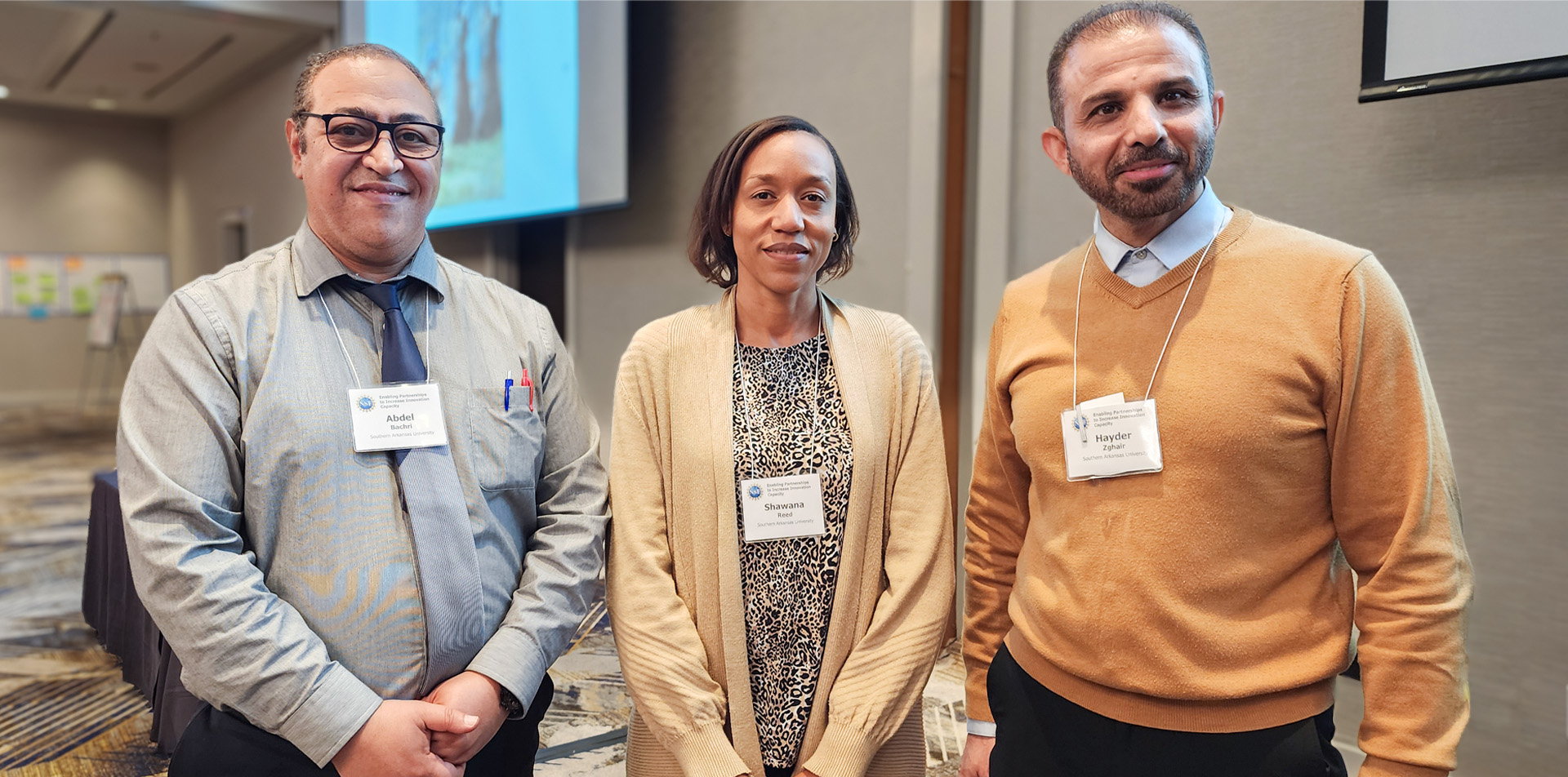
Dr. Abdel Bachri, Shawana Reed, and Dr. Hayder Zghair at the NSF EPIIC cohort-building workshop in Atlanta, Georgia.
Southern Arkansas University has been awarded a landmark $400,000 grant for a 3-year period from the National Science Foundation – the first NSF award in the institution’s history. The award is part of a larger $1.6 million collaborative project among four institutions – SAU, Guilford College, Rhode Island School of Design, and the State University of New York Brockport – under the initiative EPIIC-SPARK: Supporting Partnerships for Advancement, Research, and Knowledge.
SAU’s share of the project represents a transformative milestone for the University, strengthening its role in research, innovation, and workforce development at the heart of the rapidly emerging lithium industry in southwest Arkansas.
“This is a great way to break the ice with NSF, and it’s just the beginning,” said Dr. Abdel Bachri, principal investigator and dean of the College of Science and Engineering at SAU. “Our $400,000 award will allow us to build research capacity, form a consortium of regional institutions, and strengthen partnerships with industry. Most importantly, it positions SAU as a leader in advancing opportunities for our students, our faculty, and our community.”
The project also includes SAU’s co-principal investigators, Shawana Reed, vice president of finance at SAU, and Dr. Hayder Zghair, assistant professor of industrial engineering, who will lead key efforts in research administration, policy development, and industry partnerships.
“By laying a strong foundation for sponsored programs at SAU, we are creating lasting infrastructure that will benefit our faculty and students for years to come,” said Ms. Reed, who will assist with efforts to develop institutional policies and procedures for research administration and federal compliance.
Dr. Zghair, who will serve as the industry liaison, emphasized the importance of linking academia with real-world applications. “This project gives SAU the ability to directly connect our engineering and science programs with industry needs,” he said. “From lithium processing to advanced manufacturing, the opportunities for student learning, internships, and workforce preparation are immense.”
Through this NSF award, SAU will hire a research administration support to expand faculty access to grants and research opportunities, coordinate a regional consortium of Primarily Undergraduate Institutions in southwest Arkansas to strengthen partnerships for federal funding and STEM workforce initiatives, develop new institutional research policies and procedures to ensure compliance and long-term sustainability, and establish an industry liaison role to build and maintain partnerships with the growing lithium sector and other regional employers. Collectively, these efforts will elevate SAU’s ability to secure future federal funding, enhance collaboration across institutions, and directly contribute to meeting the nation’s projected demand for more than 120,000 new workers in the battery sector by 2030.
This NSF award builds on SAU’s growing record of success in STEM initiatives, following the $2.75 million HIRED workforce grant announced in 2024 to advance STEM workforce development across Arkansas. Together, these grants underscore SAU’s emerging leadership in STEM education, workforce training, and research capacity-building.
“First the HIRED grant, now this historic NSF award – the momentum at SAU is real,” said Dr. Bachri. “We are proving that a rural university can be at the center of innovation, workforce development, and national progress.”
The NSF Enabling Partnerships to Increase Innovation Capacity (EPIIC) program is designed to broaden participation in regional innovation ecosystems by helping institutions of higher education strengthen their capacity to build external partnerships. Supported by the NSF Directorate for Technology, Innovation, and Partnerships (TIP), EPIIC focuses on advancing key technologies, including artificial intelligence, biotechnology, semiconductors, quantum information science, and advanced manufacturing. By empowering Predominantly Undergraduate Institutions, and community colleges to contribute their expertise, EPIIC supports the TIP’s broader vision of to accelerate innovation, translate research into practice and commercial applications, and develop a skilled and inclusive workforce nationwide.
About SAU:
SAU, located in Magnolia, Arkansas, provides students with the complete college experience in a caring environment of service, innovation, and community. With more than 100 degrees in four distinct colleges and the School of Graduate Studies, SAU initiates new degree programs to fit the needs of career and professional trends of today. As part of this commitment, SAU proudly offers the Next Step Guarantee program, ensuring that students receive the necessary resources, career guidance, and support to transition successfully from college to their chosen careers or graduate studies. To learn more about SAU, visit www.saumag.edu.
